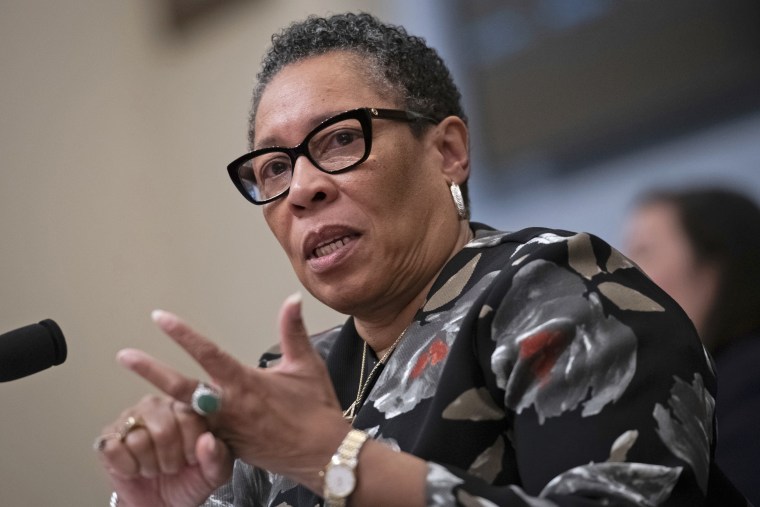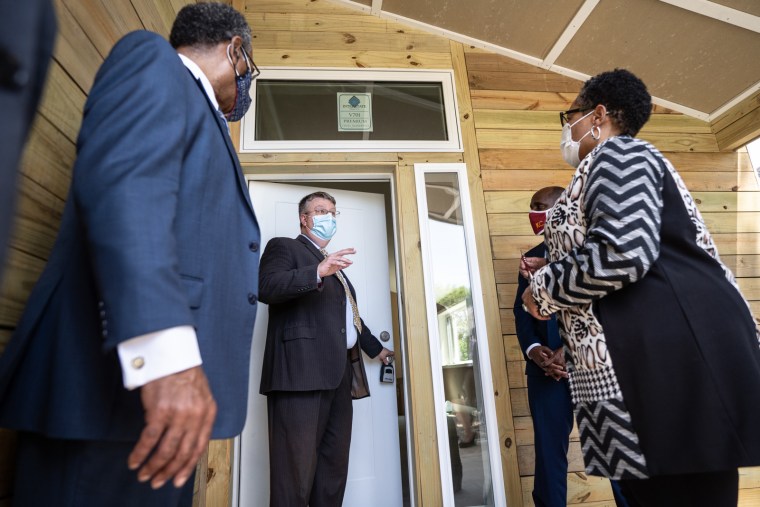During her Senate confirmation hearing to become secretary of housing and urban development this year, Marcia Fudge said HUD, “perhaps more than any other department, exists to serve the most vulnerable people in America.”
Months later, with the end of the pandemic emerging, Fudge is examining the way Covid-19 exposed America’s housing disparities, especially among people of color and low-income communities.
“There are a few things that are probably paramount to me thinking that we are going to be successful here,” Fudge said in a recent interview. “No. 1 is just for people to know that we care enough to do what is right for the people that we serve.”
At the top of her list: tackling homeownership.

The pandemic aggravated the country’s housing crisis. The dream of homeownership has slipped out of reach for many Americans. Low-income households and people of color face even greater barriers to affordable housing.
“We know that today the gap between Black and white homeownership is as big as it was in 1968,” she said. “We know that it has helped people of color in particular start to build generational wealth. That is a priority.”
Another focus will be attention to public housing, established to provide safe and affordable rentals for eligible low-income families, the elderly and people with disabilities. HUD provides federal aid to local housing agencies that manage properties for about 970,000 families nationwide.

“About 70 percent of people who live in public housing are people of color,” Fudge said. “But we have treated them so shabbily for so many years. My goal is to give them the kind of respect and dignity they deserve.”
Fudge, who said she is also deeply passionate about serving homeless populations, was recently elected chair of the U.S. Interagency Council on Homelessness.
“I think it is important for us to talk about how we move people and families who are experiencing homelessness into a secure and stable home,” she said. “And you must realize that the homeless population, about 40 percent of all homeless people, are people of color.”
Fudge has a packed schedule. One day, she’s testifying before congressional committees on Capitol Hill; the next, she's speaking to mayors by videoconference. Recently, she joined Sen. Sherrod Brown, D-Ohio, at a Black church for a Covid-19 vaccination clinic.
Fudge, who’s part of what is informally known as President Joe Biden’s jobs Cabinet, has also been hitting the road to amplify Biden's infrastructure plan. The proposal is billed as an investment in the country that would rebuild infrastructure like crumbling roads and bridges and create millions of jobs. The plan also includes major investments to address challenges like climate change, access to broadband and clean water.
“Now, the jobs plan is probably taking more of my time than most, because we’re trying to convince people who are still living in the past that housing is infrastructure,” she said.
Biden spoke about key parts of his agenda in a visit to Illinois on Wednesday, such as the bipartisan infrastructure framework announced last month and a broader plan that includes investments in housing, child care and health care.
“We need to deal with the shortage of affordable housing in America," Biden said. "Over 10 million renters in this country pay more than half their income for the rent on their apartment, and the lack of affordable housing prevents people from moving to communities where there are more opportunities.”
Fudge stressed that when it comes to infrastructure, the stakes are high.
“Some of our children have lost an entire year of education because they didn’t have broadband or high-speed internet where they lived, especially in public housing. So I’m especially pleased to be on the jobs Cabinet because, if we pass this infrastructure jobs plan, it’s putting people to work," she said. “And 90 percent of the jobs in this package do not require a college education.”
"We could put our kids to work" with summer jobs, she said. “We can put people in public housing to work, and our neighbors.”
Fudge's mother, Marian Garth-Saffold, proudly held the Bible as Vice President Kamala Harris administered the oath of office by videoconference this year because of Covid-19 restrictions.
Fudge, a lawyer and former mayor, served 13 years in Congress representing her native Ohio until she was tapped for Biden’s Cabinet. Succeeding Ben Carson, HUD’s secretary during the Trump administration, she inherited a major federal agency with a $68.7 billion budget proposed for fiscal year 2022 and 7,300 employees nationwide. At least a dozen offices under HUD regulate issues like community planning, Native American housing, mortgages and eradicating lead from homes.
As the daughter of a union organizer mother, Fudge spent part of her youth passing out leaflets, stuffing envelopes and knocking on doors to listen to people’s concerns. Decades later, that experience informs her work as HUD secretary. Fudge is the first woman to head the agency in 40 years, taking up the mantle of Patricia Roberts Harris in the late 1970s, when President Jimmy Carter appointed her as the first Black woman to lead HUD.
“So it’s just important that we start to do the things that HUD is required to do to make sure that fair housing is once again the law of the land — whether it be how we determine who is creditworthy or whether it be how we determine the value of a home in a Black neighborhood — those are all things that can be done within this agency that I want to do.”
She added: “Any of us ... whether it be members of Congress or members of the Cabinet, we are here to take care of the people who put us in place. So I think we need to look at [issues] not just from a dollars-and-cents point of view, but from a moral point of view. That is our job.”